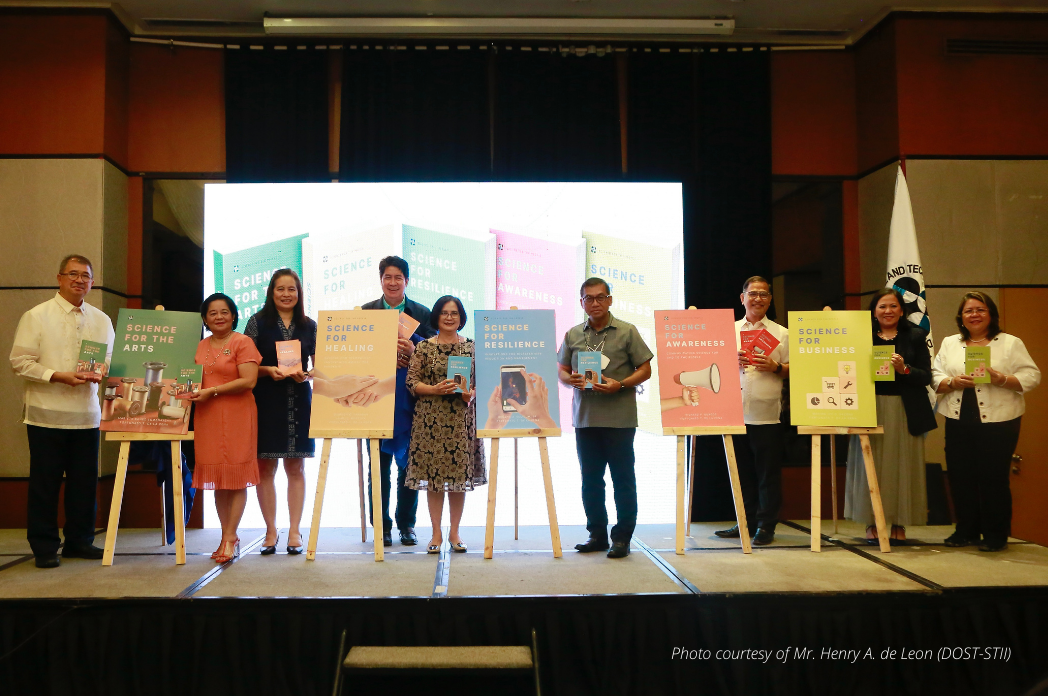NEWS AND UPDATES
Pamanang Handog sa Bayan: DOST unveils second batch of the Science for the People Book Series

With the theme “Pamanang handog sa bayan,” the Department of Science and Technology (DOST) unveiled the second batch of the Science for the People (SFTP) Book Series last 14 June 2021 at the Richmonde Hotel, Quezon City.
The book series showcases the success stories of the DOST in line with its mission of promoting the maximum economic and social benefit of the Filipino people through S&T, under the leadership of DOST Secretary Fortunato de la Peña.
Composed of five books, the series dives into the Department’s thrusts in S&T to address challenges across different sectors in the country. “These books highlight some of the innovative technologies and products introduced by our local scientists poised to generate either employment, create livelihood, and other benefits,” Sec. de la Peña said.
Together with Sec. de la Peña, the books were co-authored by other DOST executives, namely: DOST Assistant Secretary Maridon O. Sahagun and DOST-Philippine Council for Health Research and Development (PCHRD) Executive Director Jaime Montoya for the Science for Healing, DOST- National Research Council of the Philippines (NRCP) Executive Director Marieta Bañez Sumagaysay for the Science for the Arts, DOST Undersecretary for Disaster Risk Reduction and Climate Change Renato Solidum, Jr. for the Science for Resilience, DOST-Science and Technology Information Institute (STII) Director Richard P. Burgos for the Science for Awareness, and DOST-Technology Application and Promotion Institute (TAPI) Director Atty. Marion Ivy D. Decena for the Science for Business.
Science for the Arts
The first book of the series highlights the relationship of S&T with arts and humanities. In her message, Dr. Sumagaysay cited situations where the two fields support each other to produce outcomes that enhance ways of living.
Among the examples she mentioned include how the use of technology may enhance cultural expression or artistic platforms, and how art may promote science or improve technological design methods.
“As scientists, we recognize the role of arts as a platform to communicate research results and innovations. And as artists, realize that they need science to perfect their craft by using the latest technologies,” she said.
Science for Healing
Covering the initiatives undertaken by the research community in battling the pandemic, the Science for Healing Book highlights how S&T is instrumental in dealing with or in preventing emerging health crises.
As enumerated by Dr. Montoya, S&T initiatives have significantly contributed to expanding the country’s testing capacity, providing support to healthcare workers, mapping the spread of the disease for evidence-informed policymaking, searching and validating possible treatment regimens; and generating data on COVID-19 vaccines that are directly attributable to the Filipino people.
“This book is our salute to our scientists, researchers, DOST personnel, scholars, and all our partners who worked beyond the call of duty and extended their healing and caring hands to our fellow Filipinos at a time of uncertainty and need,” Asec. Sahagun said.
“It is our hope that by documenting these stories, we can generate appreciation for our own researchers and encourage more to share our vision of leading R&D initiatives to make lives better for the Filipino people,” Dr. Montoya added.
Science for Resilience
Focusing on initiatives related to building the country’s capacities against disasters, the Science for Resilience book showcases innovations such as those relating to early warning systems, transportation, and energy, among other priority areas. Usec. Solidum highlights how these innovations “are manifestations that science guides disaster risk reduction and management.”
“When we recognize the power and influence of science, technology, and innovation, we realize that we are not powerless against the consequences of disasters, and that disasters are preventable,” he said. “The innovations for disaster risk reduction and management is our way to connect to the Filipino people and give them inspiration that we are on our path to disaster resilience,” he added.
Science for Awareness
The fourth book of the series narrates the journey of the Department in promoting national awareness for science, technology, and innovation. According to Dir. Burgos, the Department has already come a long way especially in digital communication.
For instance, its official program DOSTv now has four online shows, 10 segments, and 13 million reach on Facebook. He emphasized that science communication efforts like these are critical to inform the Filipino people of how science can work for them, and to encourage them to participate in the S&T enterprise.
“While R&D projects have a beginning and end, communicating science for the people is a process that never ever ends,” he said. “We need to regularly inform our public on the developments in the areas of science, technology, and innovation,” he added.
Science for Business
The Science for Business book shares the stories of Filipino inventors, innovators, and technopreneurs in the country in building their own enterprises.
To support an enabling environment for inventors, innovators, and technopreneurs in the country, Atty. Decena highlighted how the DOST provides programs of assistance for activities such as fulfilling a concept prototype, protecting intellectual properties, creating working models, pilot testing, and commercialization.
According to Atty. Decena, results of these initiatives sustain social development. “Their successes in the fields of agriculture and natural resources, health and nutrition, advanced engineering and robotics to name a few have resulted in mitigating disasters, eradicating malnutrition, and public health concerns, improving business operations and productivity, and protecting the environment.” she said.




